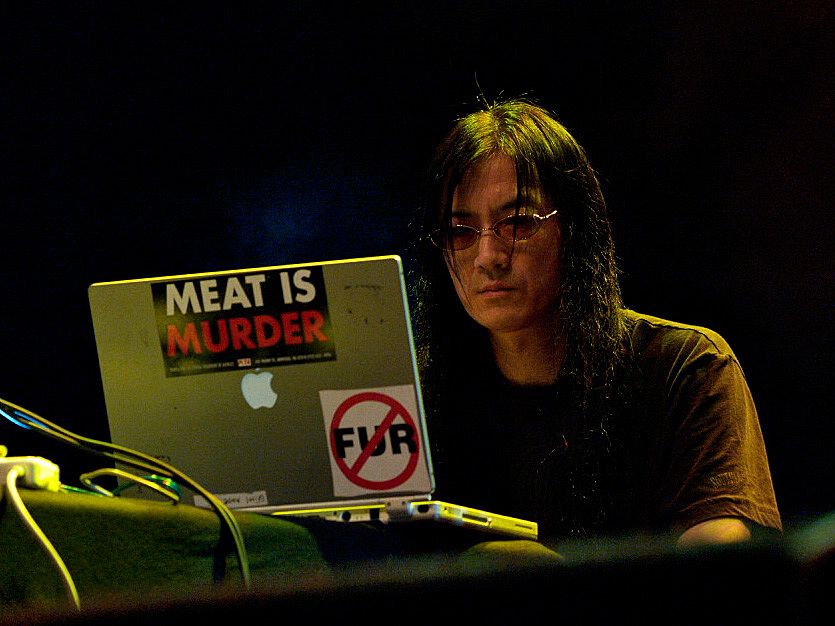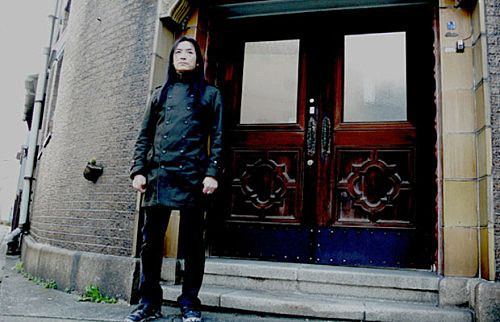MerzHero
For what does it profit a man to listen exclusively to Merzbow for a month, but forfeit his hearing?
“Sometimes, I would like to kill the much too noisy Japanese by my own Noise. The effects of Japanese culture are too much noise everywhere. I want to make silence by my Noise. Maybe, that is a fascist way of using sound.
- Akita Masami
“i like harsh noise because its kinda thrilling intense and challenging”
- ron c, Yahoo Answers
I flinched every time I started my car. I started finding excuses to walk more, which meant conveniently forgetting to charge my iPod. I would seal myself in my room, hear my flatmates pause, stop at my door, and silently tiptoe away again having shut it properly. I would walk into someone’s living room and they’d be playing Top 40. I’d hover around their stereo, catching snatches of “Climax” like a dog under a table hoping and baying for scraps. At one point, my girlfriend just burst into tears.
My name is Joseph, and I listened to Merzbow for a whole damn month.
*
In 1937, John Cage anticipated a point at which we reached “a music produced through the aid of electrical instruments which would make available for musical purposes any and all sounds that can be heard”. Nearly 80 years on, I think we’re there. Harsh, abrasive sounds are the bedrock of the most commercially and critically successful music being made right now. There’s still a big yawny streak of stately baroque and folk-influenced whatsit down the middle, sure, but it’s framed by titanic, futurist bangers on one side - pop that would have sounded completely and thoroughly alien to an audience only decades before – and a seething, hissing, rumbling underground on the other. Ferociously prolific, kind of inscrutable, and its own best-kept secret. The end of the spectrum that wears ‘noise’ not just as a genre tag, but as a rigorous academic badge of effort. And if we’re going to prolong that analogy’s suffering, Merzbow is Dux.
Akita Masami (b. Japan, 1956) has released over 350 recordings. His influences include or have included prog-rock, BDSM, and animal rights. He performs and records with virtually any and every instrument you care to name, but to the same nefarious end. You remember when your dad/mum/sibling/teacher/crush/ex had to endure your teenage record collection and mutter “But…it’s just…noise?” As Merzbow, Asami plants you square in their shoes and lets you know what it felt like. On first blush, you can’t make head or tail of it. It’s a blaring, obnoxious din, mastered impossibly loudly and somehow gouging you at every frequency. And, just like Uncle Laurie with that rap album you were playing at Christmas or Aimee Moss from 4B when you tried to make her listen At The Drive-In on your Discman, you might not come round to it. You might not be the refined music listener you thought you were.
I’d never even really listened to Merzbow before myself, though I used to parody him/harsh noise/fans of harsh noise by making a vomit-gargling cat hiss noise in the back of my throat. You can try it too, in the comfort of your living room. This is not that far off the mark, though the real thing is louder and nastier. I had one friend who went through a Merzbow phase in 2007 and had another friend who was into astrology and Modular Records around for beers. He played him part of the 50-CD Merzbox. Trembling, he flicked off the stereo. “You’re such a Scorpio, bro. You’re polite and you study hard and you go out and party, but you’ve got this fucking dark horse sting in your tail.”
Harsh noise means poor company. You’re painted as either some wallowing pervert sadist, or a self-purging asceticist – not that far off the mark, since noise artists have been known to characterize themselves as either or both. I wasn’t listening to Merzbow to transform myself, though I kinda wanted to see what would happen.
Ground rules. No playing iPod DJ at other people’s places or otherwise ‘imposing’ Merzbow on them (no burning bridges I can’t repair in November). No attempt to go through in some chronological or completist order. No resisting or interfering with another person trying to turn it down for their sanity, but no turning it down myself (always loud in the car, on headphones, or shitty laptop speakers). Also, no chickening out. Silence is not a better alternative, because silence is losing.
I started near the top of the alphabetically-ordered 10.13 GB folder, (1998’s Aqua Necromancer, AllMusic calls it “Merzbow’s tribute to progressive rock”), and hit play.
*
In my main recurring childhood nightmare, I’m riding a tricycle down Ennismore Road in Owairaka, near the house I lived in when I was very young, looking for my dad. He’s gone to work, but he hasn’t come back, and I’m meant to go out and find him. Instead, there is a deafening, cataclysmic rumble and the earth opens up underneath me. As I come off my bike, I spin down into this infernal world of belching pipes and clanging machinery and conveyor belts, and the noise is unbearable. I’m falling forever – I know there is where Dad went, and where I’m going too.
I’ve had other very bad dreams in a similar vein, and in most some form of apocalypse comes. But it’s always very, very loud and unwavering, like a static lock on the dream. The end is actually pretty samey, and it’s all the more horrible for being so.
I discuss this with my girlfriend in the car one Sunday night. The soundtrack is 2008’s Dolphin Sonar. Even if it might all seem the same,Merzbow track titles and album titles often tell us how to feel. There’s the romantic (Hybrid Noisebloom), the headbanging triumphalist (“I Lead You Toward Glorious Times”), the academic literalist (“Degradation of Tapes”). It’s only occasionally, like on here and the anti-whaling Bloody Sea, that he says: “here’s the sound of something dying terribly”.
Her: “This is like torture.”
Me: “I’m sorry. You can turn it down more if you want.”
Her: “No, I mean – you know how torture doesn’t – I guess – it doesn’t get to the ‘really bad bit’, and then it’s over and you go, okay, that’s that. If you’re being tortured, it’s meant to feel like it goes on forever. You’re meant to lose track of time, you’re meant to forget that there’s anything except this.”
She’s right, and apt. Most music gives you a narrative – instrumental, lyrical, even the merest sense of forward momentum. Merzbow doesn’t. You’re lucky to get a proper ease-in (sometimes the hideous snarl of his EMK takes five seconds to warm up at the wall) If it’s all full-on assault for twenty minutes at a time, all climax, then there’s no climax. I’m often cooking dinner (chewy and bad pasta, alone) to the sound of my worst nightmares.
But! “Dolphin Sonar (Part 3)” does wind down in its last eight-odd minutes. It could be a sub going down, water leaking, bolts pinging something settling on a cold, dark floor. It could be a protracted revenge. The devil really is in the details, and he lashes out in sharp, savage bursts.
*
Torben Sangild’s publically-accessible and pretty readable academic pieces on noise have sort of made him a de facto Internet spokesperson for noise. He even answers questions on Quora! On UbuWeb, he neatly summarises Akita’s feel:
If noise is the trash of music, the sounds that we traditionally discard as non-musical, then Merzbow is a trash artist, tirelessly seeking odd and convulsive beauty in the garbage cans of sonic waste. And, like (Dadaist painter Kurt) Schwitters, Merzbow's art is essentially urban, reacting to the overload of sensuous impressions in the big city. As a sort of apotropaic shield he throws the noise of Tokyo back into our ears, transforming it into an aesthetic experience.
By foot, by car, or by bus: I’m always running late. It’s the kind of late that makes urban weekends as bad as working days – stuck in traffic, stuck behind people, running back for something you forgot with a laptop stuck under your arm or a plastic bag of groceries in your mouth. And usually, I’m using music to escape from the overload in some sense. Not in a gross, Dirty Projectors “agrarian pastoral volk-art” sort of way, but you want to take yourself out of reality a little bit. It’s mid- October, and it sees me smack-bang in Merzbow’s 90s blockbuster period. He signed to Relapse Records, home of Mastodon, Cephalic Carnage, and Pig Destroyer. He claimed to be influenced by heavy metal, sealed one of his records in a Mercedes Benz (the ‘Merzcar’) so that the vehicle was doomed to play it forever in gridlock. His music burst out of a laptop, digitally pre-amped and louder than ever, here to destroy small speakers and shitty earbuds. When the city screams at me, I’m screaming back. And at the end of the day, it almost feels cathartic.
Writing on Japanoise, Paul Hegarty reckons something has to give when you listen to the stuff – you’re either re-educating yourself to live with it and approach it on mutual terms, or you consign it to a taxanomic old heap of rubbish having mastered it and found it wanting. When it comes to an ambient din, this is the illusion of choice, though – has Hegarty ever lived in a CBD? By the end of the month, I can’t tell you what I’d found.
I could tell Akita’s haunted bondage sex jams from his ecological rages – I could tell you I like it more when you come out the end of the century and he’s actively into sampling. But I felt constantly on edge, and (here’s a sign that music might be A Part of My Life in a way I probably deigned to reject at age 23 or so) worse, I felt like I had nothing to look forward to at the end of the day but more Merzbow. My best feat of ritual self-deprivation before this was the 40 Hour Famine, and even then I was rent with an almost religious guilt for drinking Coca-Cola in the home stretch. I felt the same going to a party on Labour Weekend and listening to stuff I probably used to listen to a lot. I doubled down, listened intently to the whorls of “Myo-Inositolasanessentia Growthfactorforhumancellsin Testosteronepropionate Anabolicaction” (from Green Wheels, 1995). My girlfriend: “This is what it feels like when we have a bad argument, too.”
On November 1st, I get home and try and listen to a bunch of music that either came out or had its makers die during MerzMonth (sorry, Lou, but Akumi did call one of his first releases Metal Acoustic Music, so you of all people should approve, right?). After 45 minutes, I feel like I’ve eaten too much rich food. I practically have to take a lie down, or at least go for a walk.
Do I regret it, and am I bewildered by trve noise junkies who manage to constantly consume Merzbow and his progeny in their serrated glory? Not really, because I’m an adult who has A: Big and significant real things to regret and B: a big and significant real appreciation for people who listen to whatever they want to listen to, and I don’t want to impugn their motives. Merzbow is playful and fun, and the air of Marquis de Sade-style torture-porn violence he might have acquired seems like a Western put-on. I mean, his output alone makes him a sort of Lil B figure of this universe. But he’s an acquired taste. Best see him live and tell the tale – and dip into his music a few times across the years and take core samples, because you might be surprised and what you encounter and even enjoy.
Below are my favourite five Merzbow tracks. No order, no claim of curatorial mastery. I like a beat where I can get it, basically, though it’s good to just listen to one of his big twelve-minute clusterfuck cacophonies as well.
Merzbow plays the Kings Arms in Auckland on Saturday 16 November, Bodega in Wellington on Sunday 17 November, Chicks Hotel in Dunedin on Tuesday 19 November, and Dux Live in Christchurch on 21 November. Tickets are available from Under The Radar. Merzbow released his tribute to New Zealand birdlife, Takahe Collage, in March 2013.



